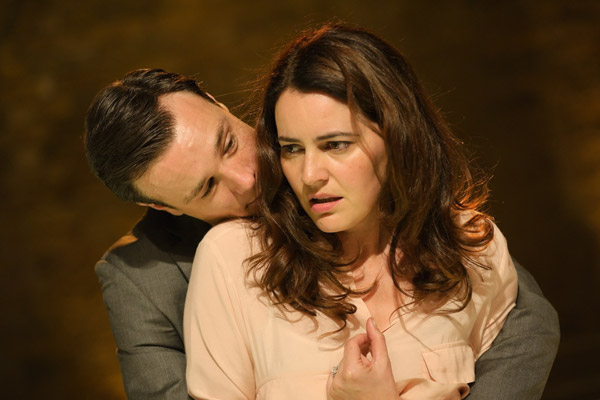Fear is a new drama by Dominic Savage and it’s one of the nastiest plays I’ve ever seen. It’s also one of the most scrappily written. Yet the subject matter and the clunky script make it weirdly captivating. We meet a pair of teenage muggers who hang around posh bits of London scoping out victims and totting up their ‘net worth’. A typical yuppie banker sports about five grand’s worth of portable accessories: Swiss watch, smart phone, designer briefcase, bespoke shoes, wallet full of cash. And these two muggers are expert valuers of lucrative prey. When they strike, they seek more than just upmarket goods. They want revenge as well.
A favourite ploy is to brutalise their victims and confront them with the proposition that robbery is morally justifiable in an unequal society. It’s an ethical night school for bankers. But things go wrong when they stab a millionaire financier to death. And at this point the play takes off in several crazy directions at once. The murdered man’s ghost shimmers back to life and engages his killer in an Aristotelian cut-and-thrust about intentions and purposes. Chastened by the ghost, the murderer visits the victim’s widow to express his remorse. But once inside her sumptuous home, he’s overcome with class hatred and he insults and attacks her. Rather than calling the police, she listens sympathetically.
This is all cobblers, of course, but because the writer has no idea what daft scene he might try next, his script has the random strangeness of truth. It’s a shame the yuppie characters have been drawn with so little interest or sympathy. The banker (played by Rupert Evans) might have been written by a Marxist computer chip. And the hapless Louise Delamere, as his wife, finds herself playing an erotic doormat. The muggers are far more satisfyingly portrayed. Both are articulate, thoughtful and self-aware. The thief-in-chief (played with vicious insouciance by Aymen Hamdouchi) breaks through the fourth wall and picks on members of the audience, treating them to torrents of self-glorifying abuse.
This is ugly and disquieting because it represents a strand of real psychosis in our society. Multicultural Britain is incubating a caste of social jihadis who feel perfectly justified in bursting out of their concrete encampments and inflicting violence on the moneyed élite. Last August they held an arson fiesta in the streets. This summer, our coverage of the Olympic Games may well be interrupted by further scenes of gory mayhem. The issue deserves to be addressed, and Savage, in his amateurish and blundering way, is trying to do just that.
His play will win no gongs for craftsmanship or profundity but it fulfils the primary task of great drama. It makes you reassess your view of your fellow man. And your fellow mugger too. As I left the theatre and hastened through the darkening streets of Shepherd’s Bush I found myself totting up my ‘net worth’ to a knife-ready thief. Answer: about five quid. At that point I realised why I haven’t been robbed in London for over 20 years. My self-confident stride has nothing to do with it. I just look like a bloody tramp.
A new production at the Finborough introduces us to an unfamiliar genre: vintage Canadian rural workshop drama. Ah, of course. That old favourite. Writer Michael Healey chronicles the experiences of a young drama student dispatched to the prairie in 1972 to write a play about farming. The show begins with a neat inversion of expectations. The farmer, a wily yokel, decides to play pranks on the dim-witted thesp. He solemnly announces that every month he executes one unproductive dairy cow in order to inspire greater efforts from the rest of the herd. The student swallows it. He also nods acceptingly when told that the farmer feeds his beef cattle on pork.
This is excellent fun. What’s less fun is the appearance of a brain-damaged bumpkin who has difficulty remembering what happened three minutes ago. The play becomes a quest to unearth this hapless twerp’s personal history. At the same time it tackles the issues of moral copyright and artistic integrity. Everything’s upside-down. The drama student, having quit the theatre to write about the prairie, has ended up on the prairie writing about the theatre. The entire piece has the baleful atmosphere of state-sponsored drama. And this makes it a strange choice for the fiercely independent Finborough. But at least it delivers one nugget of truth. Real art is whatever needs to be expressed. Bogus art is whatever needs funding to be expressed.







Comments